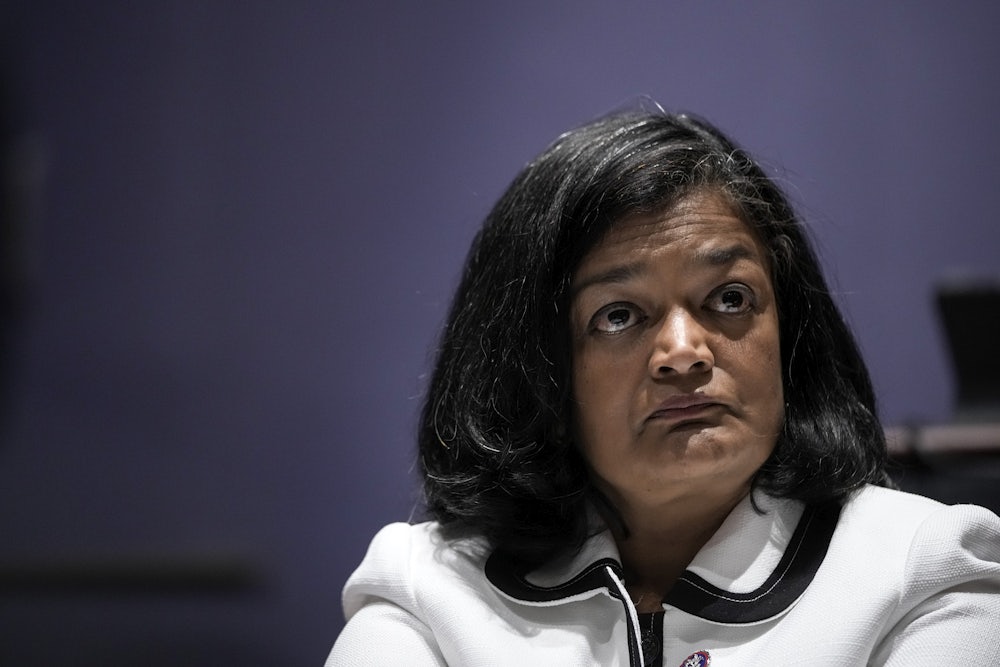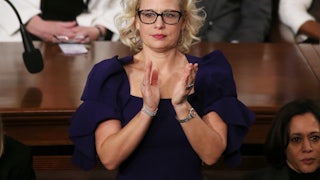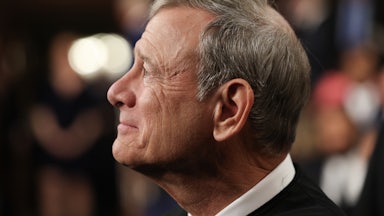Pick any top Democratic lawmaker in Washington, and it’s a make-or-break week for him or her. For President Biden, the congressional negotiations this week will essentially decide whether key pillars of his domestic policy agenda become law or fizzle in Congress. For House Speaker Nancy Pelosi, this is the week when she will either remind all of Washington that she is the master of taming all the factions of her increasingly unwieldy caucus, or she’ll suffer a blow that will tarnish that reputation permanently. For progressives, this is the week when simmering tensions with moderate Democratic lawmakers, and especially Senators Kyrsten Sinema and Joe Manchin, finally come to a head.
And for Pramila Jayapal, this is the week when she will cement herself as one of the most valuable leaders of the progressive wing of the Democratic Party, who helped push through a historic legislative win—or she risks being seen as someone who had a hand in a historic Democratic self-own.
That’s because Jayapal, the Washington congresswoman who came to Congress in 2017, is urging progressives to stop at nothing to prevent moderates from eroding Biden’s expansive $3.5 trillion reconciliation package—the package progressives value more than the hard infrastructure deal moderates like. That’s her leverage—the 96 or so votes in the Congressional Progressive Caucus that she chairs. But Manchin and Sinema arguably have even more leverage—either of them could kill the reconciliation bill single-handedly. So in many ways, this drama comes down to the question: Can Jayapal stare down Manchin and Sinema?
Jayapal insists that her progressive colleagues not cede any more ground on the reconciliation bill to moderates looking to shrink it. Moderate House Democrats and Senators Joe Manchin and Kyrsten Sinema, the two conservative Democratic holdouts in that chamber, have various gripes about the price tag or the scope of the reconciliation package (even though that price tag is for a 10-year period).
The progressives Jayapal is leading wanted the hard infrastructure bill to move through Congress essentially in unison with the reconciliation package. But earlier this week, Pelosi announced that the infrastructure bill would get a vote on Thursday, regardless of whether the reconciliation package was ready. Now, publicly and privately, Jayapal is urging her faction to stand up to the moderate Democrats and vote no on the infrastructure bill without a vote on the more expansive reconciliation package that CPC members prioritize.
“We want them to understand that for their proposal to pass—the one that they want us to pass—we have to have every vote,” Jayapal, who has been the sole chair of the caucus since January, said in an interview on Tuesday. “My approach to it has been, first of all, to be very clear early about what we wanted in the bill, what our priorities were, and what we were and weren’t willing to do. We have, secondly, been willing to compromise already. We have done that multiple times.”
She pointed out progressives had already agreed to a compromise—a $3.5 trillion package instead of the original $6 trillion. “And we’ve also compromised on voting for the infrastructure bill. So I feel like we have been really clear in what we want, but we’ve also recognized that there are compromises that have to be made, and we’ve already made a number of them,” Jayapal said.
Jayapal, along with Senator Bernie Sanders, is urging progressives to take a page out of the hard right’s playbook and take an all-or-nothing approach to these legislative negotiations. Either all congressional Democrats follow through with their promises, or Biden’s domestic policy agenda is done. “The progressive caucus has been very clear for three and a half months that we are not voting for one without the other,” Jayapal said.
It’s a stance that reflects how Jayapal has approached chairing the Congressional Progressive Caucus. “Pramila has turned the CPC into a strong political force by keeping everyone informed, having people talk through the issues and then make real commitments,” Senator Elizabeth Warren said Tuesday in an interview. Warren, choosing her words carefully, continued: “That force is now being felt when the leadership promised that all the pieces would move together. The CPC is holding that leadership accountable.”
Asked if she thought that would last, Warren shrugged: “I sure hope so.”
Up until now, Jayapal has been a less prominent figure than some of the other progressive standard-bearers in Congress, such as Sanders and Representative Alexandria Ocasio-Cortez. Jayapal was born in Chennai, India, and immigrated to the United States at the age of 16. Prior to being elected in 2017, Jayapal was an activist and state senator during a time when Republicans controlled the state legislature. Her activist work focused on registering voters and pushing for immigration reform. After winning a runoff in the Democratic primary for Washington’s 7th congressional district—the most Democratic in the state—Jayapal won the general election with about 56 percent of the vote. In the process, she became the first woman of South Asian American descent elected to Congress.
In Congress, Jayapal quickly made her mark as a member of the progressive wing of the Democratic Party. She co-sponsored legislation to make university and college tuition free. She also co-sponsored legislation to allow Congress to better regulate tech giants like Amazon and Google.
Current and former colleagues describe her as good at making clear where she stands. “Pramila’s really good at articulating a vision, and I think her communication skills are really, really good,” Washington state Senator David Frockt, who served with Jayapal in the state legislature, said on Monday. He added, “I’m not surprised [at] her prominence [in] all of this.”
Washington Lieutenant Governor Denny Heck told me that Jayapal ascended to where she is now “through an unstoppable work ethic and a rock-hard commitment to her values. The truth of the matter is, that’s not new to her in this environment. It’s how she has always approached her activism.”
Not every Democrat who’s worked with Jayapal has offered praise. She’s known as one of the harder bosses to work for on Capitol Hill, with an exceptionally high staff turnover. That sentiment among some Democrats extends beyond her days in Congress. “She’s terrible,” one Democratic strategist, who has extensively advised progressives and Washington state Democrats, said. “I’ve personally witnessed her trying to destroy people’s careers for no reason whatsoever besides she’s a grumpy person.”
Others in Washington state politics see her as a potential primary challenger to Senator Maria Cantwell when the four-term Democratic senator is up for reelection in 2024. But for now, Jayapal has risen to one of the more prominent posts within the Democratic caucus on the Hill and has held the Congressional Progressive Caucus together. “She’s been very hold-the-ground, and the whole crew is with her,” an aide to a member of the CPC said Tuesday evening of the CPC calls.
“I think while we all share the same views, we don’t always necessarily use the same tactic, but I think it’s been effective,” Congressman Dan Kildee, a CPC member, said of his faction’s position. “The issue is, everyone should use their leverage right up until the point where that leverage is exhausted and it’s time to vote, and I think the leadership of the caucus has done well in managing that.”
The moderates, though, are equally dug in. New Jersey Representative Mikie Sherrill, a member of the moderate Blue Dog Coalition, said she stressed to her colleagues that the infrastructure bill had to pass and had to pass now. The reconciliation package had to pass as well, Sherrill said, but when “it is ready to be passed.”
Jayapal, I pointed out, would rather wait on the infrastructure bill than decouple the reconciliation package. “I think that would be a very poor choice at this point, when the American people are looking to us to deliver,” Sherrill said. She added, “I have equally critical things that I need to see passed in the reconciliation bill, but again, we’ve got to get [the infrastructure bill] passed this week.”
Jayapal argues that the majority of Democrats are essentially on her side. “Ninety-five percent of the Democratic caucus is ready to vote yes on this bill because it’s the president’s agenda,” Jayapal said. “It’s the Democratic agenda. So this isn’t a progressives-versus-moderates fight. This is Democrats-versus-whoever-wants-to-stand-in-the-way-of-this-agenda fight. And that’s just a couple handfuls of people. It’s really two handfuls of people,” meaning Manchin and Sinema.
Jayapal has said she’s talked with Sinema recently but refrained from sharing any more details of those conversations. She also said she’s in touch with top Biden administration brass: chief of staff Ron Klain and White House director of the office of legislative affairs Louisa Terrell, as well as Pelosi. She has embraced the rush of requests for interviews, and she had to cut our interview short to do an MSNBC hit.
It’s undeniable that whatever the outcome of the showdown of the infrastructure bill and the reconciliation package, Jayapal has gained visibility within the party. She’s a bigger player now, with a caucus that’s proven it can’t be ignored.
That also means the stakes are higher than they’ve ever been for her congressional career. If progressives follow through with their threat to sink the infrastructure bill because the reconciliation package didn’t get a vote, the moderates like Sinema and Manchin will blame her. House Democratic moderates will vote against the reconciliation package, and Biden’s domestic agenda will be dead, just as midterm campaigns start to ramp up.
But if she plays her cards right, and all the Democratic factions on the Hill come together, she’ll be hailed as a deft progressive leader. It’s a high-reward situation, but one with an equally high level of risk.
Grace Segers contributed reporting for this piece.








